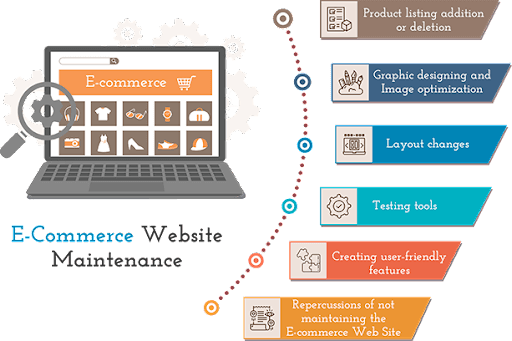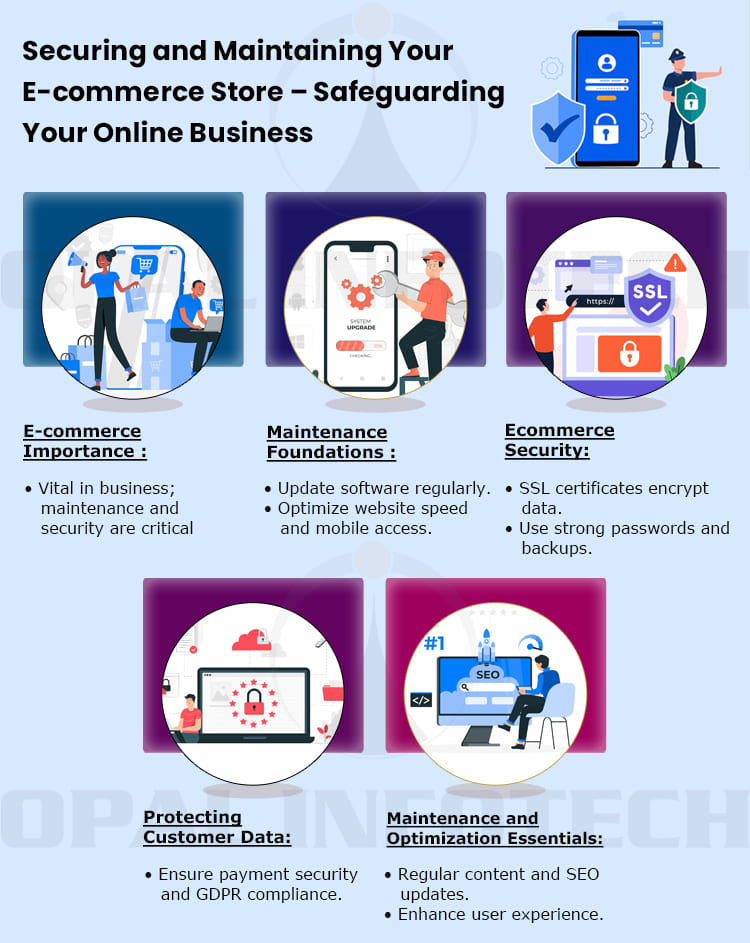In the contemporary digital era, e-commerce has evolved into a fundamental component of the business landscape. The prevalence of online shopping has propelled the e-commerce industry into a phase of unprecedented growth. Yet, amid the abundant opportunities presented, there also arise significant responsibilities that accompany the dynamic nature of this sector. Ecommerce web maintenance and security are paramount to safeguard your online store’s success. This article will guide you through essential strategies to ensure your online store remains secure, optimized, and ready to face any challenge.
The Foundation of Ecommerce Maintenance
Regular Software Updates
To safeguard your online store, by prioritizing regular software updates. Your e-commerce platform, plugins, and extensions need to be up to date to prevent vulnerabilities. Hackers often exploit outdated software to gain access to your website.
Website Performance Optimization
Optimizing your website’s performance is crucial for user experience and SEO. Faster loading times not only keep customers happy but also improve search engine rankings. Make sure your images are compressed, and your code is clean to achieve optimal speed.
Mobile Responsiveness
With the growing number of mobile shoppers, your online store must be mobile-responsive. Ensure that your website is accessible and functional on all devices, from smartphones to tablets. Websites that are mobile-friendly receive higher rankings as a reward from Google.
Ecommerce Security Measures
SSL Certificate
The first step in ensuring security is obtaining an SSL certificate. This encrypts the data exchanged between your website and users, preventing eavesdropping. Customers trust websites with “https” in their URL.
Strong Passwords and Two-Factor Authentication
Educate your team on the importance of strong passwords and enable two-factor authentication. Implementing this measure adds an additional layer of security, heightening the difficulty for unauthorized users attempting to access your online store.
Regular Backups
Regularly back up your website and databases. In case of a cyberattack or data loss, having a backup will allow you to restore your online store quickly. Consider using automated backup solutions.

Protecting Customer Data
Payment Security
Online stores deal with sensitive customer information, especially during the checkout process. Use secure payment gateways, encrypt payment data, and comply with Payment Card Industry Data Security Standard (PCI DSS) requirements.
Privacy Policy and GDPR Compliance
Be transparent about how you handle customer data. Develop a comprehensive privacy policy and ensure adherence to the General Data Protection Regulation (GDPR) if your customer base includes individuals in Europe.
Ecommerce Maintenance Essentials
Content Updates
Regularly update your website’s content. Fresh, relevant content keeps customers engaged and improves SEO. Use a content calendar to plan updates and product listings.
SEO Optimization
Ecommerce maintenance with SEO optimization including relevant keywords in your product descriptions, meta titles, and meta descriptions help to improve your website’s visibility in search engine results.
User Experience Enhancement
Focus on enhancing the user experience. Guarantee effortless navigation, transparent product categorization, and implement a responsive design to enhance the shopping experience, ensuring a seamless process for your customers.

Frequently Asked Questions (FAQs)
1. How often should I update my e-commerce website?
Regular updates are essential. Aim for monthly updates, including product listings, content, and software patches.
2. What is the role of an SSL certificate in e-commerce security?
The integration of an SSL certificate encrypts the data exchanged between your website and users, serving as a protective measure for sensitive information.
3. What is two-factor authentication, and why is it important?
The incorporation of two-factor authentication enhances security by necessitating users to provide two forms of identification before gaining access to an account, thereby adding an extra layer of protection.
4. What steps can I take to ensure GDPR compliance for my online store?
To make your online store GDPR compliant, create a privacy policy, obtain consent for data collection, and respect customer rights to data access and deletion.
5. Why is SEO essential for e-commerce maintenance?
SEO helps improve your website’s visibility on search engines, leading to more organic traffic and potential customers.
6. How can I enhance the user experience of my online store?
Enhance the user experience by providing clear navigation, easy product search, and responsive design for mobile users.
Conclusion
Ecommerce maintenance and security are the cornerstones of a successful online store. By following these strategies, you can safeguard your business, gain the trust of your customers, and stay ahead in the competitive e-commerce landscape. Protecting your online store is not an option; it’s a necessity. Maintain a vigilant approach, consistently update your website, and prioritize security to excel in the dynamic realm of e-commerce.











